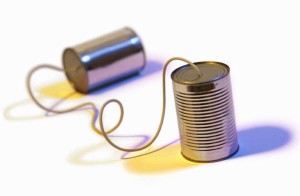Watch your tone
 “Watch your tone, Arden”, my mother would say to the teenage me when I’d speak to my brother in a certain way. Sometimes I’d answer that I was just asking him to do something. “But your tone was rude”, my mom would reply.
“Watch your tone, Arden”, my mother would say to the teenage me when I’d speak to my brother in a certain way. Sometimes I’d answer that I was just asking him to do something. “But your tone was rude”, my mom would reply.
When I work with clients on customer service skills, I talk about the importance of tone, especially on the phone, because people can’t read body language to ascertain the meaning of what was said. Email is even more challenging because not only can you not read body language, you also can’t hear the tone.
Recently, I posted a reply to someone in the Image and Etiquette Group on LinkedIn that I moderate. She had mentioned something about the dessert fork and spoon should only be placed above the plate when there are no waiters. I responded that I have seen the dessert fork and spoon placed above the plate even when there are waiters. Then I wrote, “actually, when are there not waiters?”
With no tone or body language to get the full meaning of what I wrote, she thought I was being disrespectful and condescending. She also thought I was referring to wait staff in homes, and wrote “some people aren’t as fortunate as you to have people serving them in their homes.”
Oh boy, what happened here? I was not trying to be disrespectful of her opinion and was merely pointing out what I’ve observed. I assumed she was talking about wait staff in restaurants and she thought I was talking about servers in people’s home. Because of the lack of body language and voice inflection we misinterpreted each other’s words and meaning. (Oh, and no, I don’t have servers in my home. That’s pretty funny actually.)
It is very hard to determine what someone’s tone is in written correspondence, especially if you don’t know them well. I was reminded that even something that seems quite innocuous to me can be misinterpreted. It is important to think through how your words might be received.
If you are sharing an opinion or disagreeing with someone, it might serve you well to have someone else read what you wrote before sending it. Also, sarcasm is very hard to interpret through writing, and best not attempted.
Have you ever written something that was terribly misinterpreted? Or, did you read something and think it meant one thing only to later learn it meant something very different?
Please note: We have a new method of delivering blog posts to your inbox. If you have previously received these blog posts through Feedburner, please subscribe to receive these blog posts through the form below and unsubscribe to the posts you receive through Feedburner.
2 responses to “Watch your tone”
-
This reminds me of Rosanne Rosannadanna, to whom I have been compared. Actually, it was Gilda Radner’s other character, Emily Litella who would spout off on some topic, only to find out she had completely misinterpreted the intent (like presidential “erections”, making Puerto Rico a “steak”, and “busting” school children.) So, while I can’t think of any particular incidents, I have become much more aware of how the person with whom I’m talking is reacting to what I say, and try to adjust my tone when it seems like I’ve wandered off….
-
Ha, I love it Carole! You certainly have the playfulness of Rosanna Rosannadanna. Not familiar with Emily Litella, but she sounds hilarious. All those SNL characters were great, especially in the Gilda Radner time.
Thanks for commenting. It’s nice to “see” you back here.

 Sign up for the award-winning Clise Etiquette newsletter and receive a free chapter of Arden's book Spinach in Your Boss's Teeth.
Sign up for the award-winning Clise Etiquette newsletter and receive a free chapter of Arden's book Spinach in Your Boss's Teeth.
Leave a Comment